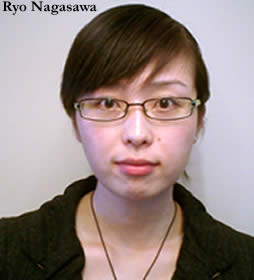 Ryo Nagasawa Program Officer, of Japan Society Film Program was Born in 1979 in Yamagata, Japan and she grew up in a family-owned movie theater business in northern Japan. Ryo moved to US in 1998 and received her Bachelor of Fine Arts in Photography from Purchase College, State University of New York in 2004.
Ryo Nagasawa Program Officer, of Japan Society Film Program was Born in 1979 in Yamagata, Japan and she grew up in a family-owned movie theater business in northern Japan. Ryo moved to US in 1998 and received her Bachelor of Fine Arts in Photography from Purchase College, State University of New York in 2004.
In 2004 and 2005 Ryo Nagasawa worked on two film series, Critic’s Choice: Susan Sontag on Japanese Film, Part II and Otaku Cinema Slam!. She has also worked as a film coordinator on After War, Hiroshi Sugimoto Film Series: The Moving Image of Modern Art and Against the Tide: Rebels and Mavericks in Contemporary Japanese Film.
Cinema Without Borders: Please tell us about the involvement of the Japan Society in New York in organizing the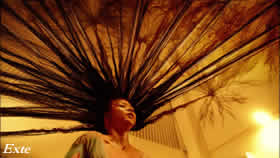 Japan Cuts Film Festival.
Japan Cuts Film Festival.
Ryo Nagasawa: 2007 is to pacify the 100th year anniversary to celebrate the centennial year we launched the Japan Cuts: Festival of New Japanese film. This will be the first annual film festival that we hope to continue for long years to come.
CWB: Are there movies participating in Japan Cuts in different categories?
Ryo: Japan Cuts is broken into 5 categories: The first one is called Long Cuts, and that includes 18 feature films, 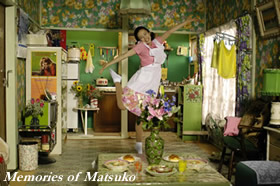 and this also includes documentary and narrative fiction films, and they are all premiered for the first time in the US. The second category is the Short Cut which includes 60-70 short films, and most of them are brought over from a film festival called Nippon Connection held in Frankfurt, Germany. They have a great selection of digital work in one of their categories; we are bringing over a part of Nippon Connection to Japan Cuts as a part of the Short Cuts category. We have 9 different categories within Nippon Connection on Tour mainly from the Japanese domestic film festivals such as the Tokyo Video festival, the Yubari International Fantastic film festival, or from a website called Open Arts which has many artistic short films. Digista is also a rapidly growing TV show that is discovering a lot of new talent in art animation and short films. Third is Turtle Bay Cuts which is a screening of “Gamera the Brave”, a monster film which is free to everyone. The fourth category is called New York-Japan Cuts, which is an event for New York based filmmakers, and professionals which include people in the industry who are looking for contacts. We first started with the screenings of three films, made by either American or Japanese
and this also includes documentary and narrative fiction films, and they are all premiered for the first time in the US. The second category is the Short Cut which includes 60-70 short films, and most of them are brought over from a film festival called Nippon Connection held in Frankfurt, Germany. They have a great selection of digital work in one of their categories; we are bringing over a part of Nippon Connection to Japan Cuts as a part of the Short Cuts category. We have 9 different categories within Nippon Connection on Tour mainly from the Japanese domestic film festivals such as the Tokyo Video festival, the Yubari International Fantastic film festival, or from a website called Open Arts which has many artistic short films. Digista is also a rapidly growing TV show that is discovering a lot of new talent in art animation and short films. Third is Turtle Bay Cuts which is a screening of “Gamera the Brave”, a monster film which is free to everyone. The fourth category is called New York-Japan Cuts, which is an event for New York based filmmakers, and professionals which include people in the industry who are looking for contacts. We first started with the screenings of three films, made by either American or Japanese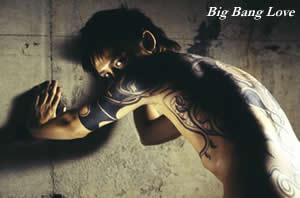 filmmakers, and a whole mixture of situations somewhat related to New York, US, and Japan. These screenings will be followed by a networking salon where we can talk to filmmakers about their own projects, funding information, about which organizations are funding projects like that, and film commissions in Japan. There are also discussions about the recent rise of female filmmakers in Japan and the guest speaker is Miwa Nishikawa, director of “Sway”. These discussions will be moderated by Marian Masone of the Film Society at Lincoln Center.
filmmakers, and a whole mixture of situations somewhat related to New York, US, and Japan. These screenings will be followed by a networking salon where we can talk to filmmakers about their own projects, funding information, about which organizations are funding projects like that, and film commissions in Japan. There are also discussions about the recent rise of female filmmakers in Japan and the guest speaker is Miwa Nishikawa, director of “Sway”. These discussions will be moderated by Marian Masone of the Film Society at Lincoln Center.
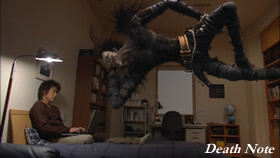 CWB: Are any of the film directors who are nominated for awards attending the festival?
CWB: Are any of the film directors who are nominated for awards attending the festival?
Ryo: Yes we have 5 guests. The first guest is Shusuke Kaneko the director of “Death Note” and its sequel, Miwa Nishikawa director of “Sway”, Naoko Ogigami the director of “Kamome Diner”, Yasuo Kurita the director of “Monsieur Greenpeas”, and Shion Sono the director of ““Exte: Hair Extensions””
CWB: What are different events of the 2007 festival?
Ryo: Well other than film screenings and discussions, we also have a launch party following the screening of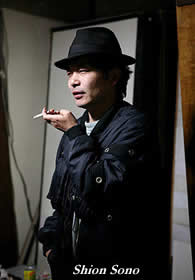 “Death Note” on July 6th at 11 pm. Everybody who attends the screening of “Death Note” will be invited to the party with the combo ticket which includes the screening and the party. There is another party called the Onigiri party on Sat. July 14 which will be following the screening of “Kamome Diner.” The screening starts at 8:15 p.m. and the party will start at 10:20 p.m.
“Death Note” on July 6th at 11 pm. Everybody who attends the screening of “Death Note” will be invited to the party with the combo ticket which includes the screening and the party. There is another party called the Onigiri party on Sat. July 14 which will be following the screening of “Kamome Diner.” The screening starts at 8:15 p.m. and the party will start at 10:20 p.m.
CWB: How can film fans attend the screenings of the movies?
Ryo: People have to purchase tickets either on the web, by calling our box office, or through our website for all the feature films under Long cuts. For the Short Cuts, all the screenings are free to the public. Turtle Bay Cuts is also free, and this is where we are showing “Gamra the Brave”—the monster film—and there is no need to make a reservation. In the New York-Japan cuts people need to purchase tickets, which are $5 per person, and the discussion is also a charged event where they have to purchase tickets.
CWB: Do you have discounted tickets for the film students?
Ryo: Not particularly for film students, but for all students we have a student discount. The discount price is $4.50 per student which is significantly lowered compared to the $10.00 that is generally charged. There are 700 tickets available at this rate.
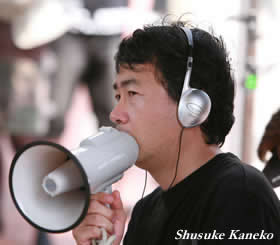 CWB: What should we look forward to in the 2007 festival? Any exceptional films or new talent?
CWB: What should we look forward to in the 2007 festival? Any exceptional films or new talent?
Ryo: All of the films are very special to us. I am sure a lot of Asian film fans will love to see “Big Bang Love” which is directed by Takashi Miike, a lot of people are following the films of this director. Death Note, and also its Sequel “Death Note: The Last Name”; this was a smash hit in Japan and will be a new premiere with the director, Shusuke Kaneko, in attendance. “Nightmare Detective” director, Shinya Tsukamoto is known for “Haze”, and “Iron man”, now he is a legend and this is his latest film. “Exte: Hair Extensions” by Shion Sono, starring Chiaki Kuriyama; this will be a new kind of Japanese horror and will be very funny and scary.
CWB: Please tell us about your plans for the future of the Japan Cuts Film Festival
Ryo: We would like to have the festival every year around July, and we will continue to present the latest Japanese films that have never been shown in New York.
http://japansociety.org/

